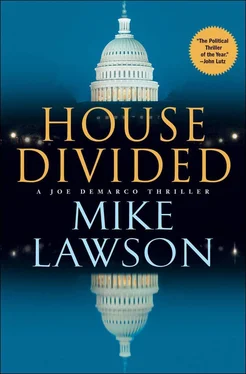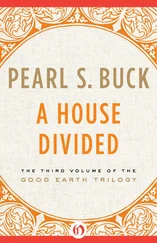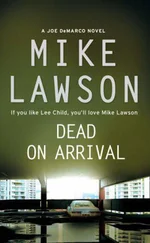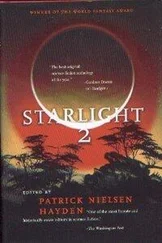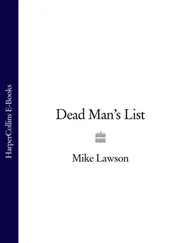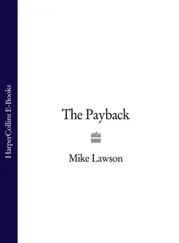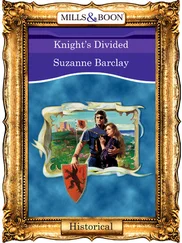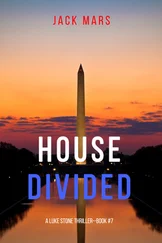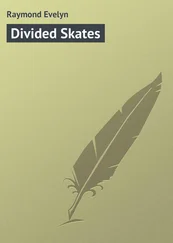Mike Lawson - House Divided
Здесь есть возможность читать онлайн «Mike Lawson - House Divided» весь текст электронной книги совершенно бесплатно (целиком полную версию без сокращений). В некоторых случаях можно слушать аудио, скачать через торрент в формате fb2 и присутствует краткое содержание. Жанр: Триллер, на английском языке. Описание произведения, (предисловие) а так же отзывы посетителей доступны на портале библиотеки ЛибКат.
- Название:House Divided
- Автор:
- Жанр:
- Год:неизвестен
- ISBN:нет данных
- Рейтинг книги:3 / 5. Голосов: 1
-
Избранное:Добавить в избранное
- Отзывы:
-
Ваша оценка:
- 60
- 1
- 2
- 3
- 4
- 5
House Divided: краткое содержание, описание и аннотация
Предлагаем к чтению аннотацию, описание, краткое содержание или предисловие (зависит от того, что написал сам автор книги «House Divided»). Если вы не нашли необходимую информацию о книге — напишите в комментариях, мы постараемся отыскать её.
House Divided — читать онлайн бесплатно полную книгу (весь текст) целиком
Ниже представлен текст книги, разбитый по страницам. Система сохранения места последней прочитанной страницы, позволяет с удобством читать онлайн бесплатно книгу «House Divided», без необходимости каждый раз заново искать на чём Вы остановились. Поставьте закладку, и сможете в любой момент перейти на страницу, на которой закончили чтение.
Интервал:
Закладка:
DeMarco had always liked women-with the possible exception of his ex-wife-but after meeting Alice and talking to Alice’s unnamed boss, his perspective was beginning to change.
35
Dillon had always been rather indifferent toward automobiles, and he didn’t enjoy driving at all. It was just too frantic-the stop-and-go traffic, the maniacs constantly switching lanes, honking, maneuvering for position. He took cabs as often as possible. Today, however, he decided to drive himself.
It had always been a Crane family tradition to own Jaguars, and he owned a maroon XJ-Series sedan that sold for about ninety thousand with all the bells and whistles. Naturally, his had all the bells and whistles. He drove out the gates of Fort Meade and headed toward Washington, D.C. He had decided to go to the National Mall to ponder on Charles Bradford as it seemed the perfect place to make a decision that would indeed affect the nation.
Dillon may have come across as a jaded cynic but he was, in fact, terribly sentimental when it came to the National Mall. It symbolized all that was good and great about America: her past, her glory, her promise. The long, broad expanse between the Capitol and Lincoln’s memorial, Washington’s obelisk, Jefferson’s temple, the memorials to those who had died in war, the magnificent buildings surrounding the mall containing art and history and the machinery of democracy… After all these years, the sight still took his breath away.
He parked near the Vietnam Veterans Memorial, in front of a fire hydrant. He didn’t care if he got a ticket but he didn’t want the car towed, and to prevent that from happening he placed a placard on the dashboard that read FEDERAL BUREAU OF INVESTIGATION. TOWING OR TAMPERING WITH THIS VEHICLE IS A CLASS B FELONY. The placard had the FBI’s official seal on it.
Dillon had no idea what a class B felony was, or if there even was such a thing, but the sign had worked in the past. Traffic enforcement folks probably figured an FBI agent who drove a Jag was someone special.
He took a slim leather briefcase out of the car and began to walk.
He sincerely believed, as he had told Claire, that exposing Charles Bradford would be disastrous for the country. The United States was not well regarded in large parts of the world, and even our allies believed that to safeguard our fragile economy, much less our security, we wouldn’t hesitate to subvert any regime that posed a threat. Dillon imagined citizens in other countries would not even be surprised that an American general went about assassinating high-ranking foreigners.
Dillon also had to admit he agreed with most of Bradford’s decisions-not the executions themselves but the fact that the men Bradford killed had indeed been national security menaces. It could be argued that Bradford had acted without proper authority and shouldn’t have acted unilaterally, but it was clearly better to eliminate a single foreigner than go to war. How many American lives could have been saved if a single well-placed bullet had been used to fell Saddam?
He didn’t concur, however, with Bradford killing American citizens whom he considered traitors. Morality aside, if it ever became known that Bradford had assassinated fellow Americans, every bleeding-heart liberal in the country-as well as every right-leaning anti-government militia nut-would have all the evidence they needed to justify their paranoia.
By the time he reached the Lincoln Memorial, Dillon found himself in exactly the same position where Martin Breed had been before he died. He saw the logic in the things Charles Bradford had done but knew in his heart that the man had gone too far. He also knew if Bradford remained in power that the assassinations would continue and the possible unintended consequences could be disastrous. As Claire had said, Bradford could actually start the war he was trying to prevent if he killed the wrong foreign politician.
Dillon’s thoughts were interrupted by a peal of laughter from a small girl, the sound of a child absolutely delighted by something. He looked over and saw a man his age holding the hand of a girl of four or five: a grandfather taking his granddaughter for a walk. The little girl was pointing a short, chubby finger at a fat, waddling pigeon.
Dillon had never even come close to getting married. He knew he’d make a terrible husband. And the thought of rearing children… well, that was absolutely terrifying. Yet for some reason after his sixtieth birthday, he occasionally wished that he had a grandchild to spoil, and preferably a granddaughter. It was an irrational desire.
But back to Charles Bradford.
Dillon was too objective not to recognize his own hypocrisy. What Bradford had done was in a way no different than what he and Claire were doing. Bradford had taken it upon himself to decide who America’s enemies were and then he eliminated them. Dillon, although he didn’t kill people-Hopper was the only exception-had taken it upon himself to invade the privacy of American citizens and trample on their constitutional rights. But Dillon knew there was a wavy gray line out there and he believed he was on the right side of that line, whereas Charles Bradford had stepped over it. Way over it. Was he deluding himself? Maybe. Nonetheless, he had made up his mind: Bradford had to go.
He stopped at a bench in front of the Lincoln Memorial, wiped off the bench with a handkerchief, and sat down, crossing his long legs. “What would you do, Abe?” he said, softly but out loud.
Abe didn’t answer.
As he had told Claire, he wasn’t convinced that releasing the Breed recording would be enough to force Bradford to resign, much less convict him of a crime. Unless John Levy was willing to testify against Bradford, which Dillon couldn’t imagine him doing, there was no concrete evidence to support Martin Breed’s claims. And Dillon could foresee congressional hearings going on for months, if not years, resulting in a national quagmire proportional to Watergate and possibly concluding with Bradford still in uniform and more popular than ever in some political circles.
Then there was the problem that exposing Bradford would most likely result in revealing the NSA’s role in Bradford’s downfall. That would be a calamity for the agency, and not just a public relations nightmare. If what Dillon and Claire were doing was uncovered, it could possibly result in the complete dismantlement of America’s most effective intelligence organization. He couldn’t allow that to happen. He wouldn’t allow that to happen.
So how would he do it? How would he, Dillon Crane, remove General Charles Bradford, Chairman of the Joint Chiefs, without exposing either Bradford or himself?
The answer, he was convinced, was John Levy.
From his briefcase he took out the file on Levy that Claire had compiled. He’d already read it twice and knew every word in it, but he read it again, hoping something would leap out at him.
The psychic impact of Levy’s tragic family history was obvious. When Levy was two, his father’s helicopter was shot down on some spy mission at the beginning of the Vietnam conflict-before the United States was even officially at war-and the body was never recovered. His brother, who was several years older than Levy, enlisted in the army at age eighteen, and then he also disappeared in Vietnam during the final days of that terrible war. Like his father, Levy’s brother was MIA, presumed dead, and no body was ever recovered. So it was no mystery as to why John Levy joined the army, nor was it a mystery why he became one of the sentinels at the Tomb of the Unknowns. The unnamed bodies in the tombs at Arlington were his father and his brother.
But Dillon believed that, for Levy, being a tomb guard was meaningful on another level. There was a religious aspect to being a sentinel but, instead of praying matins and vespers, the sentinels put on a uniform and walked at a measured pace in front of an unnamed corpse. The young men who guarded the Tomb of the Unknowns, like all those deeply committed to a particular faith, willingly dedicated themselves to ritual and sacrifice and a higher calling-and none was more dedicated than young John Levy. But Levy needed something more: he needed someone to replace his dead father, his dead brother. And when he met Charles Bradford at the time Bradford commanded the Old Guard, he found that person and later devoted himself totally to Bradford and his cause.
Читать дальшеИнтервал:
Закладка:
Похожие книги на «House Divided»
Представляем Вашему вниманию похожие книги на «House Divided» списком для выбора. Мы отобрали схожую по названию и смыслу литературу в надежде предоставить читателям больше вариантов отыскать новые, интересные, ещё непрочитанные произведения.
Обсуждение, отзывы о книге «House Divided» и просто собственные мнения читателей. Оставьте ваши комментарии, напишите, что Вы думаете о произведении, его смысле или главных героях. Укажите что конкретно понравилось, а что нет, и почему Вы так считаете.
